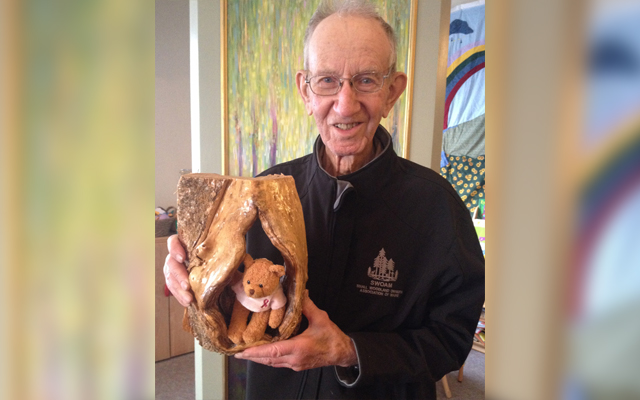Many people have spent a lot of time on land connected to Larry Park’s family.
Park’s grandfather spearheaded the movement to start the Aroostook State Normal School, now the University of Maine Presque Isle, and Park himself grew up in the 1930s on farmland that now hosts Park Hall.
Anyone who has skied the cross-country trail network at Aroostook State Park has glided through some of Park’s land, including his Red Pine tree plantation. Regular visitors to Wintergreen Arts Center in Presque Isle may have seen his woodworking creations or heard him playing folk tunes on the banjo.
Park stays busy these days in a range of work and hobbies, indoors and outside.
“I’m working on this history of the B&A railroad and I’m working some in the shop,” he said at his home on Echo Lake Road. He and his wife Edith, who met square dancing, raised five children at their home.
Park’s family moved to Echo Lake Road in 1943. The family first lived on farmland that became the Presque Isle Air Base, now home to Northern Maine Community College and Skyway Industrial Park, and then settled on land across from UMPI.
Park grew up working on the farm and in the woods during the Great Depression and World War II. In the 1950s, he enlisted in the Air Force during the Korean War, spending three years in the service and travelling to California and England in the process.
“That first winter was the worst fog I think they ever had,” he said of his time around London. “There were people walking off the dock because they couldn’t tell where the edge of it was.”
Park’s military service was cut short when his father suffered a heart attack and died soon after. Park then took over the family farm on Echo Lake Road, in the midst of Aroostook County’s potato empire days, and began a long career in farming and forestry.
He raised tablestock potatoes and seed potatoes — the latter still an important market for Maine potato growers — and experimented with new varieties.
“Sometimes you buy something you think is good seed, but it turns out not to be,” he said, recalling one crop of seed potatoes that he ended up selling to a starch factory .
Park did have success as one of the first local growers of Red Norland potatoes, a variety developed in North Dakota that remains a popular tablestock spud.
He also turned his attention to growing trees, as Aroostook County farmers made new efforts at soil conservation and taking sub-prime lands out of production.
“An acquaintance I had met who was a forester talked to me about planting trees on the unused fields,” he said. “In 1957, we planted 100 Norway spruce, which was a new tree here.”
Park ended up planting about 20 acres of woodlots as part of the American Tree Farm System. One of the woodlots is a 1,000-tree Red Pine Plantation, through which the state park’s cross-country ski and snowshoe trails run.
In the early days, Park noted he and his family were happy to see that the young Red Pines provided excellent habitat for deer and were not damaged by the animals.
“Your wildlife prospers on a woodlot that’s managed,” he said, “not just clearcut, but managed sustainably.”
Anyone looking to grow trees or manage a woodlot can learn a lot from Park. “Things go up and down, but it’s a long-term investment,” he said.
Park is as much a woodsman as a farmer. He stopped farming in 1995 and rents out his fields, but owns a small sawmill and continues to work on various wood projects, from small-scale tools and art displays to home and community projects. He and Edith also enjoy spending time at the family camp on the Machias River in the North Maine Woods.
He recalled the smell of milled cedar, and the pink hues he found once after milling out a spruce that had been struck by lightning.
“The smell of wood freshly cut I have always loved,” he said. “You never know what you’re going to find when you saw into something.”








